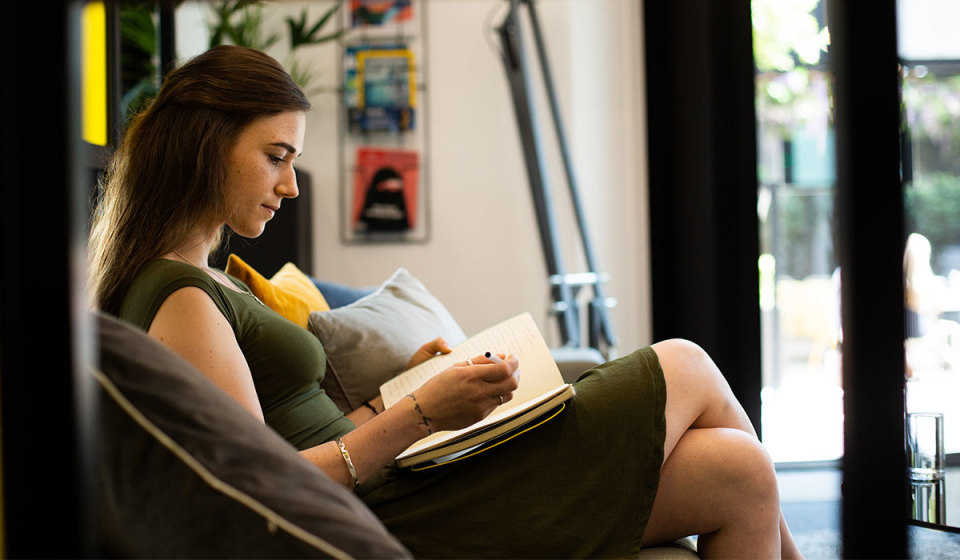'Creativity is sparked by simply listening': why your workplace is your best source of new ideas
By Bruntwood Works

Creativity is increasingly important in the workplace, whether you’re in the arts or IT. Free up some brain space with a walk or a podcast, or collaborate to get the ideas flowing
“When I ask my course participants where they find inspiration, nobody ever answers ‘at work’,” says creativity expert and author Andy Green, founder of storytelling training consultancy Story Starts Here. “But it doesn’t have to be that way! We’re all phenomenal creativity machines. We all dream every night. And our dreams are just as good as the stuff we see on TV or at the cinema.”
Being creative, he points out, is often just a matter of looking at something a different way. Take your journey to work, for example. “You might think it’s boring. It’s not! You’re bombarded by new stimuli. You have lots of disruptions. Things don’t go to plan. It all helps spark creativity. It’s the richest, most creative part of your daily schedule.”
And in today’s workplace, being able to harness that creativity is vital. Fifty-eight per cent of employers expect creativity skills to grow in importance in the next three years, according to the Driving the Skills Agenda report from the Economist Intelligence Unit. And the World Economic Forum suggests, in its list of the top 10 skills you need to thrive in the workplace, that “creativity” will have gone up from 10th place in 2015 to third place by 2020. “Creativity is the critical competitive edge,” says Green. “If you can out-think and outsmart your competitors, that’s going to give you the advantage.”
There are a multitude of methods you can use for inspiration. Christine Cort, managing director of Manchester international festival (MIF), knows plenty about creativity – since its inception in 2007, MIF has commissioned artists including Björk, Steve McQueen, Jeremy Deller, Wayne McGregor, Maxine Peake, Damon Albarn and Marina Abramović.
Her personal top tip to spark creativity is to “surround yourself with people who think differently”, and MIF as a whole encourages everyone to do that. The festival was founded on the principle of commissioning brand new work, with artists encouraged to do the unexpected, and develop projects with unlikely collaborators.
Space and sharing, in particular, are key ways to keep that spirit of adventure alive.
“Our current, wonderful workspace in central Manchester is open-plan and designed to be a space where people can easily interact, rather than relying on email,” says Cort. “We want everyone in the team to feel they can contribute to and encourage the open exchange of ideas and the sharing of information. Other activities aimed at fostering creativity are our monthly team lunch, where members of the MIF team can bring food to share as the adjunct to informal conversation, and a regular ideas breakfast.”
It’s easy to see how creativity drives the staff at MIF – but what about when you’re in an industry not noted for its creativity? Doris, based in Liverpool, specialises in placing the next generation of IT professionals in sustainable IT roles. They might not be producing art, but there’s plenty of creativity here all the same.
“You might not think of IT as being creative, but it’s just a different kind,” says Amy Gornall, Doris’s PR and marketing manager. “On the tech side, it’s about automation – getting computers to do all the stuff that nobody wants to spend time on, as you want to do the new, fun stuff that gets your creative juices flowing. That drives the industry forward. I’m fascinated by how you can be creative with numbers – looking at the analytics behind your online presence, for example.”
Much of the time, creativity is sparked by actually taking a break from thinking. Gornall uses a technique that Green calls “incubation” to spark creativity – changing your physical state in order to change your mental state. (If you’ve ever “slept on” a problem to try and solve it, or you like to go for walks and think about things, that’s incubation.)
“If I’m writing a blog, for example, I’ll go to the cafe round the corner, or sit by the docks we have here in Liverpool,” says Gornall. “You have to be in the right environment for the idea you’ve got at the time.” She’s also a big fan of podcasts to get herself in the zone. “I don’t listen to music any more!” And that, in itself, sparked an idea: she recently set up a company podcast called Doris Does Data.
This kind of activity is all about freeing up brain space, says Green. “Our conscious brains can only handle a tiny fraction of data, but our unconscious brains can handle much more. By going for a walk, or listening to a podcast, you are disengaging from what is holding you back.”
He also recommends doing something different if you can’t find the right approach to a problem. “One of the biggest enemies of creativity is what’s called functional fixation, where you fixate on the wrong problem. I once worked in an office that had a door code of four numbers. I put in the numbers and the door didn’t open. It was only later that I discovered I was turning the handle the wrong way!”
And in many cases, he says, creativity is sparked by simply listening. “Your best creative friends are your ears. Your reality, your workplace, your customers – these are your best sources of potential new ideas and creativity. Don’t instantly dismiss or disagree: explore. Everything is a lesson.”
Non-independent content produced as part of a commercial deal with Guardian Labs.